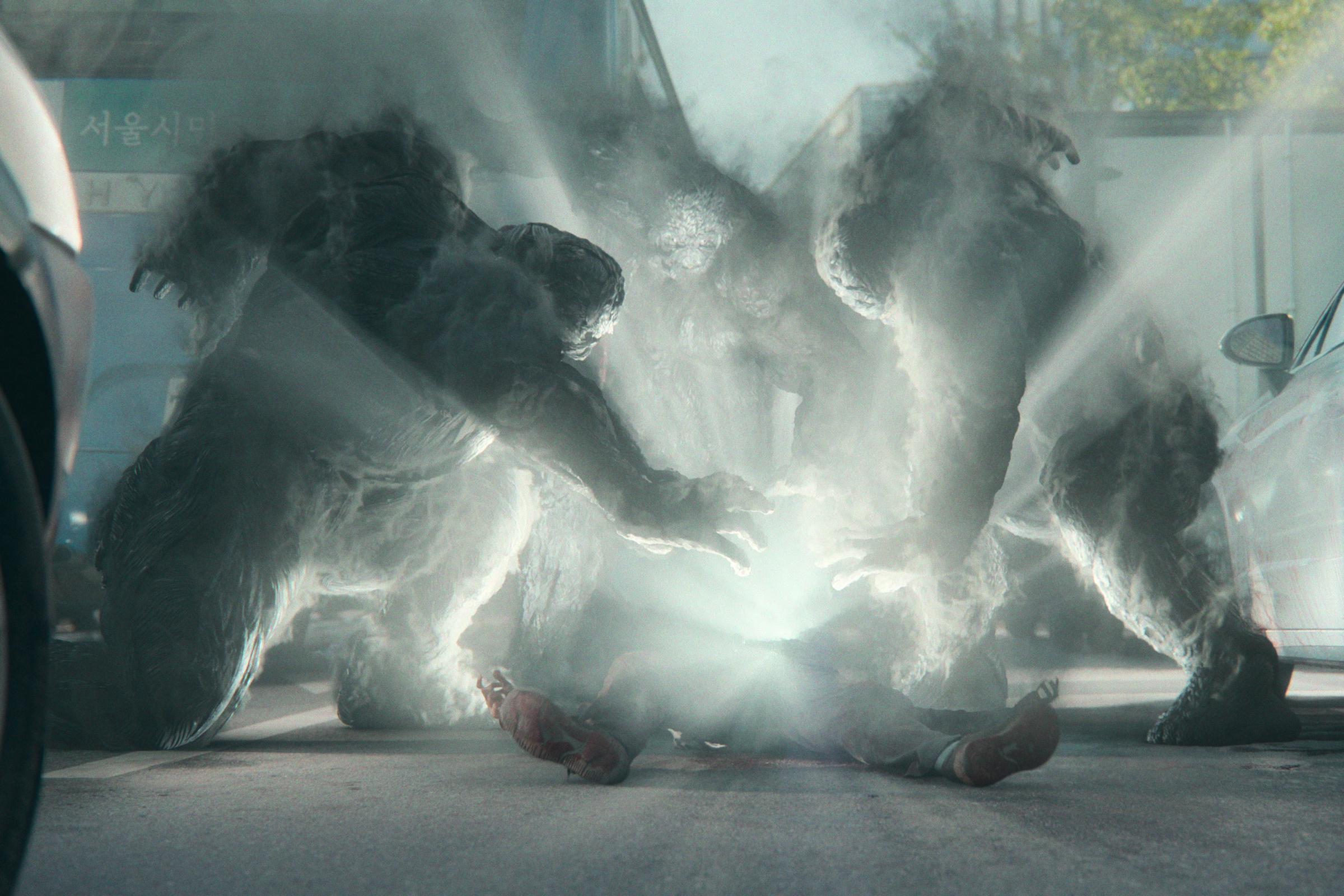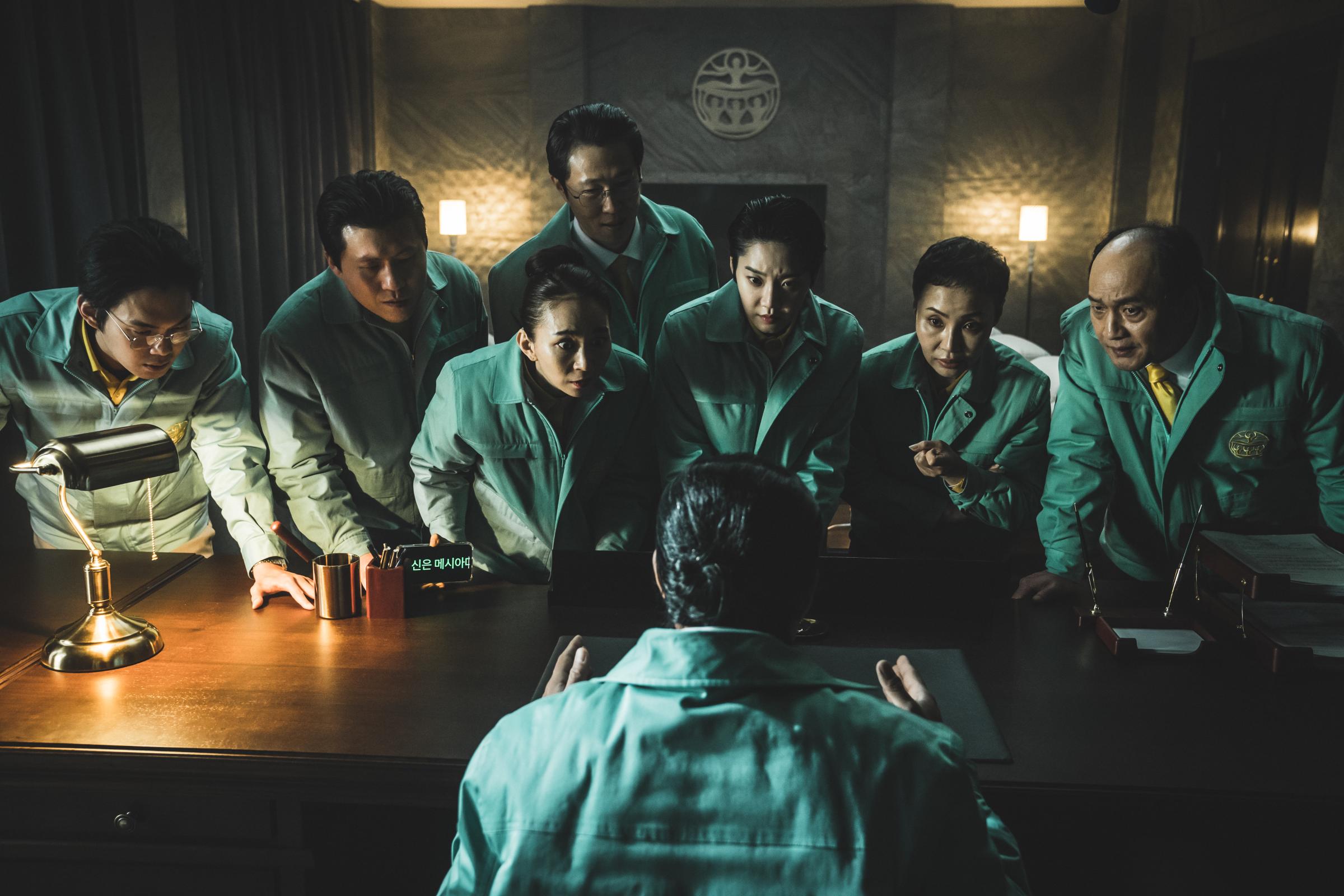The story of Hellbound first came to director Yeon Sang-ho in a dream, or perhaps more accurately, a nightmare: Yeon was running away from unknown beings chasing him, and he was scared. “That sense of fear really left a strong impression on me, and I thought I should write something about this,” Yeon, 43, says of inspiration for the first script he wrote, when he was 20. That script would be developed into his 2003 animated short film, The Hell. It would see another iteration, though with a different plot, in the 2019 webtoon Hellbound, which Yeon created with illustrator Choi Gyu-seok. Now, he and Choi have co-written a direct adaptation of that webtoon with a six-episode live-action Korean series, released on Netflix on Nov. 19. The show’s opening sequence, in which a man frantically tries to escape from three monstrous creatures who have appeared to condemn him to hell, plays out much like that decades-old nightmare.
In Netflix’s Hellbound, humans receive decrees from supernatural beings about the date and time they are bound for hell—this journey takes the form of those aforementioned monsters burning them to crisps. Led by Jung Jinsu (Yoo Ah-in), the cult-like organization The New Truth appears to be the only group with an inkling of an explanation to the horrific phenomenon. Hellbound is gripping and provocative, a thriller that’s much more concerned with the psychology of the humans driven toward fanaticism than the action behind the otherworldly damnations. The story chillingly interrogates the extent to which humans will go to protect their beliefs—even if those beliefs prove false.
Read more: Here’s Everything New on Netflix in December 2021—and What’s Leaving
The series dropped just two months after the release of Squid Game, Netflix’s most-watched series of all time, and in a time of booming global interest in Korean content. In the week of its premiere, Hellbound was the most-watched non-English television series on Netflix and entered the top 10 in TV in 71 countries including the U.S., according to the platform. Yeon is no stranger to receiving widespread international recognition for his work. His 2016 zombie thriller Train to Busan was a global hit, grossing $92 million worldwide. An English remake of the film, led by director Timo Tjahjanto, is in the works from New Line Cinema. And a recent report of its title, Last Train to New York, has sparked controversy.
Over Zoom and through a translator, Yeon spoke to TIME about adapting Hellbound from webtoon to screen, the continued rise in popularity for Korean content and the U.S. remake of Train to Busan.
TIME: Hellbound began as an 11-minute animation in 2003. How did you come up with the idea for the story?
Yeon Sang-ho: When I was 20, I wrote my very first scenario, and that was for the short animation The Hell. And it actually started with a dream that I had that was very one-dimensional. I was being chased by these unknown beings, and obviously I had to run away from them and make sure they don’t catch up with me. And that sense of fear really left a strong impression.
How has your outlook on the story changed over time?
In the very beginning I focused more on the individual fear, the fear of unknown beings and not being able to know what is happening. However, as I became an adult, went into society, what Choi Gyu-seok and I talked about was if things like this were to happen in real life, what would happen in our society? And in the process of creating the script, we tried to draw a lot of possible scenarios that could happen and then handpick among them, together, what can create a sense of consistency.

Though Hellbound includes supernatural events, it focuses on the humans and how they respond those events. What messages about humanity did you hope to convey?
If we were to categorize the genre for Hellbound, it would be cosmic horror. The genre of cosmic horror deals with a story that happens with a cosmic or an absolute being intervening in human society. And by nature, this genre makes humans seem extremely small, almost miniscule. In a way, I think it’s a great genre to show how these immense supernatural beings can reduce humans into puny, vulnerable beings. And I think through cosmic horror, not only can you focus on the smallness and vulnerability of humans, but at the same time it is a great genre to highlight the strength, the power that only humans can show.
What did you hope to show through the different groups like New Truth, Arrowhead—which uses violence to enforce what they believe is God’s will—and the law enforcement parties?
The world that we live in, we humans boast and we believe it to be very logical and reasonable. The world that you see in Hellbound, it is where a world that used to be run based on reason is overcome by another set of reasons. It returns to being barbaric. And I think that contrast of being reasonable and being barbaric, they are contrasting one another much like how supernatural beings and humans are in contrast to one another. I was intrigued by the juxtaposition of these two opposite ideas, and I wanted to bring that to life.
What were the biggest differences between putting the idea onto paper in the webtoon versus adapting the story for a live-action drama?
The biggest difference is that these very complex human emotions have to be portrayed by actual live actors. We use the word “act” or “actor,” but we needed people who could really portray this as if they were actually experiencing these things. So I thought that the most important thing was going to be casting the right people. That was the biggest challenge that I had when I was creating the live-action series and the issue that I wrestled with the most.
You’ve talked about having Yoo Ah-in in mind when you wrote the script for the live-action series of Hellbound. Why did you want him to portray Jung Jinsu?
I thought of the character Jung Jinsu as someone who has an unwavering logic that’s really solid inside him. This is not a person who tries to justify his beliefs, but whose beliefs are so strong and so well-rooted, that it’s just unwavering. This shows in the way he speaks or acts and in scenes when he shows his emotions. It had to be portrayed in a way where it was not in-your-face, but it’s contained and it shows at certain moments. I see Yoo Ah-in to be someone who shares that with Jinsu in that there is something very firm about him. Not only in the way we see him in films, but as a person too, Yoo Ah-in is very determined, and I thought that he was very close to Jinsu in that way.

Squid Game became a global phenomenon in recent months. Did the immense, worldwide popularity of a Korean series affect your expectations about how Hellbound might be received?
When we were first in discussion about creating Hellbound as a live-action series with Netflix, we really didn’t have the mass public in mind. We were thinking that the core target audience was going to be those who have always been fans of this genre. I think the interesting thing about art is that you sometimes will see things happening without what you, the creator, ever thought of. And I think that’s exactly what happened with the global phenomenon of Squid Game. I think that probably the people at Netflix and also the creators didn’t expect for Squid Game to be received in this way. And I also think it’s the same for Hellbound. We didn’t think that we would be releasing the series in the wake of such a global phenomenon. So not only the core target that we first had in mind for Hellbound are watching our series but a great number of people have enjoyed the show and have been having a lot of conversations, and I consider myself very lucky to have been the creator behind that.
Your 2016 film Train to Busan was a global hit. What do you think has contributed to the rise in popularity for Korean entertainment?
It might seem sudden, but I believe that many film and drama creators were able to gradually accumulate credibility in the global market with high-quality content, and I feel like that has led to this explosive interest. Korean content gradually won the trust of the global audience in the past 10 to about 15 years, and that has led to this explosive event.
There is currently a U.S. remake of Train to Busan in the works. What are your hopes for the remake? Are you concerned that anything might get lost in translation?
We use the expression or word “remake,” but I do not think that a remake is something that you just apply more sophisticated technology to based on an original piece of work. I believe a remake should be a completely new creation. And as the creator of the original work, I do not think that there need to be similarities between the remake and the original Train to Busan. I actually hope that it will have its very own unique qualities and a new vision. In fact, as the creator, if it was almost exactly interpreted compared to the original work, wouldn’t it be better to just watch the original Train to Busan? So I think that the new creation is definitely going to be something that holds the new director’s vision, and my personal hope is that the new remake will not really refer to or think too much about being loyal to the original work, but be a completely new creation.
Shifting back to Hellbound: the ending is quite shocking—could you share any plans for season 2?
Rather than talking about a possibility for a season two, I will say that beginning from this summer, writer Choi Gyu-seok and I have been planning the story that follows where the story has now ended for the original webtoon. We have decided that we will begin working on the stories that are to follow, beginning probably the second half of next year. As for whether we’ll be creating that into a live-action series, we have not discussed anything on that yet.

Does it take a personal toll on you working on projects with heavy subjects like Hellbound?
It is true that when I am writing the stories and the very emotions of the characters in the story I try to empathize with them and relate to them. However, I do not see my personal life and the things that I work with as being the same thing. While I try to really immerse myself into the story that I’m creating, I’m fully aware that this is something that I am working on so there aren’t cases where I see it affecting my personal life.
Is there anything else you would like to add?
I understand that there are many people after watching Hellbound who would like to hear what I think as the creator about this series. However, when I was creating this, rather than what I feel or anything that I have to say as a creator, I strongly believe that it is more important to focus on how the audience accepts it and how the audience interprets it. And so I’m very cautious as to speaking too much about how I think because I fear that it may interfere with the viewing experience. I hope viewers can watch the show and have many conversations about it with their friends and family. I’m also curious to see in about one or two decades, whether the message that we’re sending through Hellbound will still be valid or will be obsolete. But at the end of the day, I just hope that you enjoy Hellbound.
—with reporting by Aria Chen and Soo Jin Kim
More Must-Reads from TIME
- Caitlin Clark Is TIME's 2024 Athlete of the Year
- Where Trump 2.0 Will Differ From 1.0
- Is Intermittent Fasting Good or Bad for You?
- The 100 Must-Read Books of 2024
- Column: If Optimism Feels Ridiculous Now, Try Hope
- The Future of Climate Action Is Trade Policy
- FX’s Say Nothing Is the Must-Watch Political Thriller of 2024
- Merle Bombardieri Is Helping People Make the Baby Decision
Contact us at letters@time.com